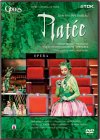![Poulenc: Dialogues des Carmelites [1999]](/pictures/1028770.jpg) Poulenc: Dialogues des Carmelites | DVD | (16/08/2000)
from £N/A
| Saving you £N/A (N/A%)
| RRP
Poulenc: Dialogues des Carmelites | DVD | (16/08/2000)
from £N/A
| Saving you £N/A (N/A%)
| RRP Poulenc's late pious works for voice share the sprightliness of his early secular orchestral and chamber pieces; this is perhaps especially true of his 1952 work of devotion and martyrdom. Young aristocrat Blanche seeks refuge in the cloister from her fear of death only to find the Carmelites she joins the object of persecution by the Jacobin Revolution; she flees, but then comes back to share her sisters' death--a powerful scene in which a hymn is stripped down a voice at a time, and finally silenced when Blanche joins them on the guillotine. Anne Sophie Schmidt as Blanche is convincing both in her terror and her resignation; Patricia Petibon is delightful as her closest friend, the lively young nun Constance to whom fear is never especially an issue and who has sought death cheerfully from the start, praying that the dying Prioress might be saved and she taken in her place. The older women--the two Prioresses and Mere Marie who persuades the nuns to refuse compromise--are equally fine in their graver music. --Roz Kaveney
![Die Tote Stadt - Korngold [2001]](/pictures/1028471.jpg) Die Tote Stadt - Korngold | DVD | (06/08/2002)
from £25.00
| Saving you £-0.01 (N/A%)
| RRP
Die Tote Stadt - Korngold | DVD | (06/08/2002)
from £25.00
| Saving you £-0.01 (N/A%)
| RRP Any fan of Alfred Hitchcock - and in particular of Vertigo his film in which Kim Novak gives male fantasies something to feed on - is certain to love Eric Wolfgang Korngold's Die Tote Stadt (The Dead City). This was the finest opera to come from the pen of this composer of film scores who found both fame and fortune in Hollywood. It relates the remarkable tale of the protagonist Paul and his individualistic approach to dealing with the loss of his beloved wife Marie. As the drama unfolds all is not what it seems - dream and reality intertwine as Paul attempts to come to terms with the past in exchange for a tolerable future.
 Rameau - Platée / Marc Minkowski, Laurent Pelly, Opéra de Paris | DVD | (19/03/2004)
from £27.55
| Saving you £2.44 (8.86%)
| RRP
Rameau - Platée / Marc Minkowski, Laurent Pelly, Opéra de Paris | DVD | (19/03/2004)
from £27.55
| Saving you £2.44 (8.86%)
| RRP Platee - Rameau
![WAGNER: Die Walkure - Sir Simon Rattle / Berlin Philharmonic Orchestra (Willard White / Eva-Maria Westbroek / Eva Johansson / Robert Gambill) [Blu-ray] [2008]](/pictures/1089517.jpg) WAGNER: Die Walkure - Sir Simon Rattle / Berlin Philharmonic Orchestra (Willard White / Eva-Maria Westbroek / Eva Johansson / Robert Gambill) | Blu Ray | (27/10/2008)
from £26.98
| Saving you £3.01 (10.00%)
| RRP
WAGNER: Die Walkure - Sir Simon Rattle / Berlin Philharmonic Orchestra (Willard White / Eva-Maria Westbroek / Eva Johansson / Robert Gambill) | Blu Ray | (27/10/2008)
from £26.98
| Saving you £3.01 (10.00%)
| RRP ![Prokofiev - The Love for Three Oranges [2007] - Mahler Chamber Orchestra/Tugan Sokhiev](/pictures/1087300.jpg) Prokofiev - The Love for Three Oranges | DVD | (26/11/2007)
from £17.66
| Saving you £-11.67 (N/A%)
| RRP
Prokofiev - The Love for Three Oranges | DVD | (26/11/2007)
from £17.66
| Saving you £-11.67 (N/A%)
| RRP  Johann Strauss - Die Fledermaus / Marc Minkowski, Salzburg Festival 2001 | DVD | (04/03/2003)
from £20.00
| Saving you £4.99 (24.95%)
| RRP
Johann Strauss - Die Fledermaus / Marc Minkowski, Salzburg Festival 2001 | DVD | (04/03/2003)
from £20.00
| Saving you £4.99 (24.95%)
| RRP Hans Neuenfels' unconventional production of Johann Strauss' opera with new dialogue: Marc Minkowski is the musical director.

Please wait. Loading...
This site uses cookies.
More details in our privacy policy